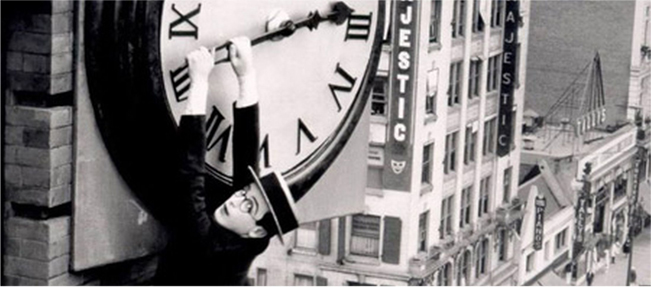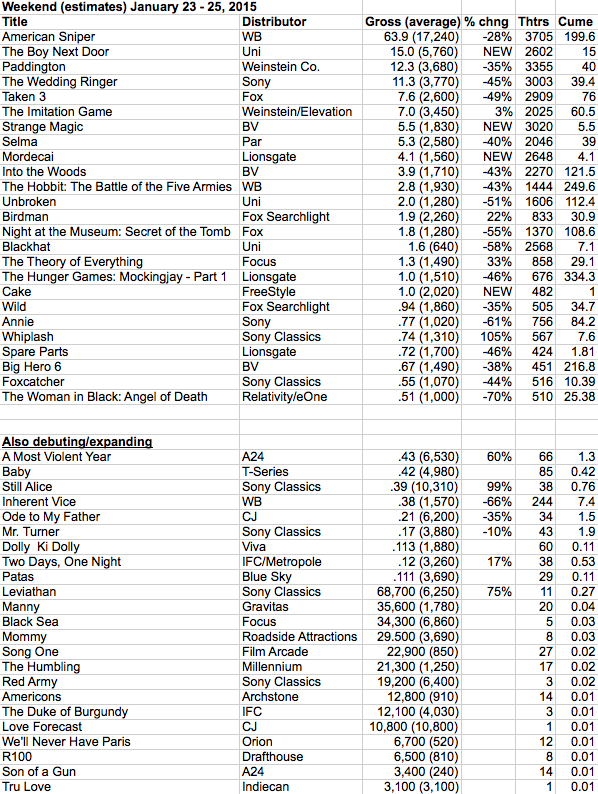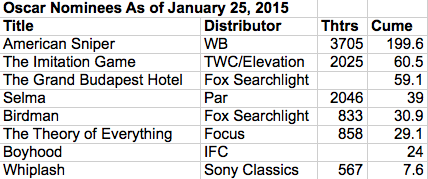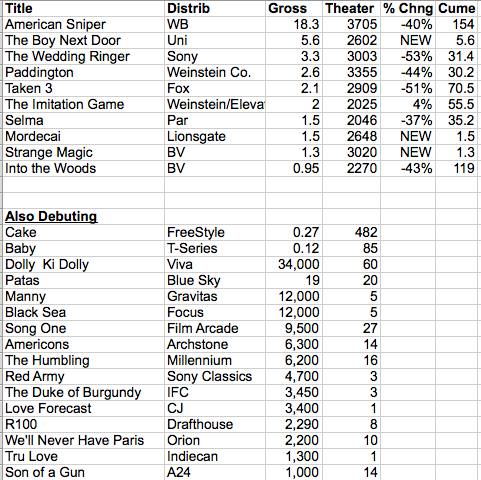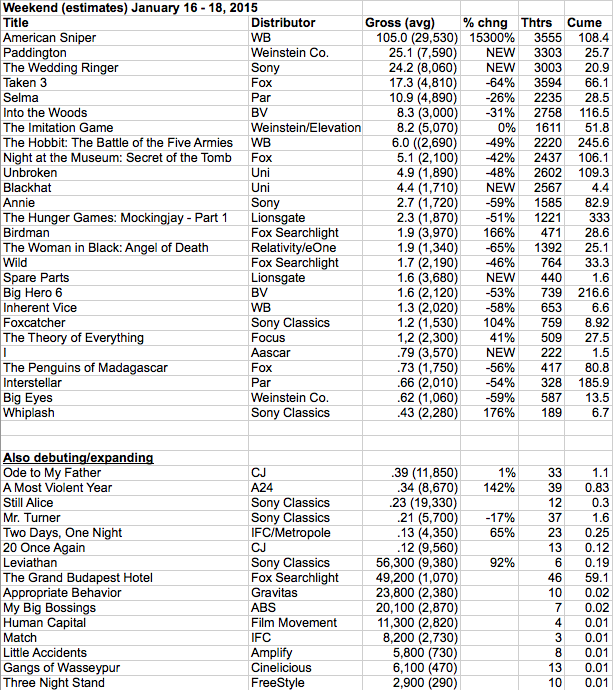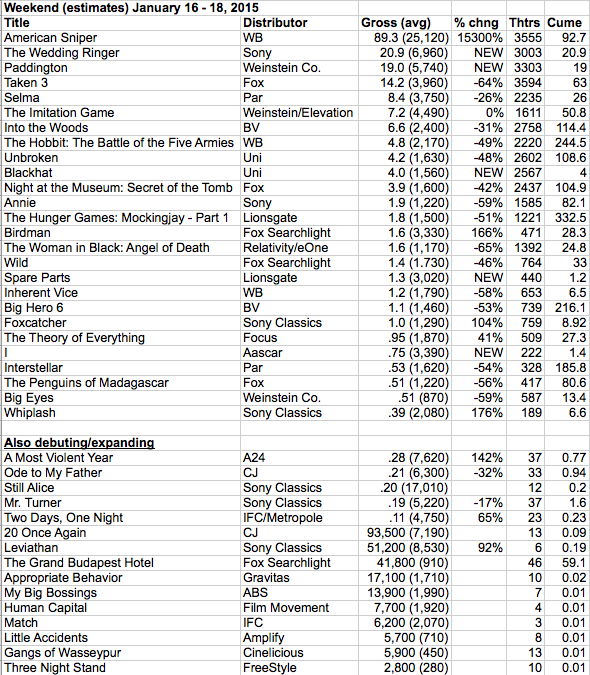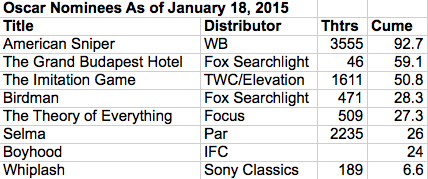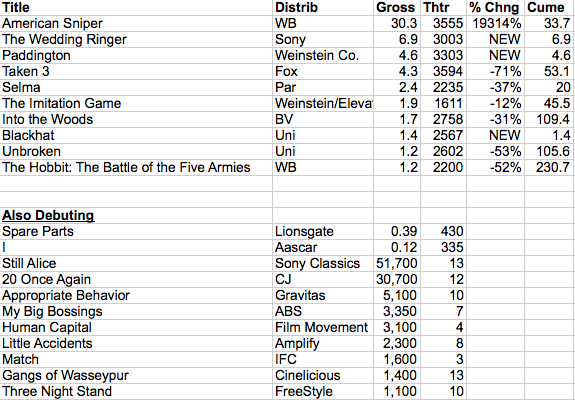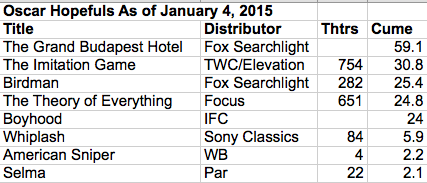The Hot Blog Archive for January, 2015
Friday Estimates by Still Snipin’ Klady
On my way to a family-style screening of Sponge Out of Water, which should probably have been the Secret Screening at Sundance, given the deep spiritual journey that an anthropomorphic sponge without its life-sustaining surroundings suggests. Anyway… crap box office weekend, so…
American Sniper has a normal drop… for a change. The film hit $200 million in wide release on its 11th day of expansion ($3.42m in exclusive until then), making its run comparable to the last Rings movie and Despicable Me 2 on that basis. Because of the long limited release and the Wednesday opening of The Passion of the Christ, direct comparisons are iffy. So, 3rd Friday vs 3rd Friday, Sniper did $2 million more than Passion on the day, but is about $13 million behind Passion overall. Both films showed, in their early weeks, a tendency to a huge Saturday bump. If that trend continues as it has been for Sniper, it will pass $250 million by a few million by the end of this weekend… and still be about $11 million behind The Passion. But with numbers like these, there is nothing but good news.
The openings for newcomers… all suck. One of the hot gimmicks these days is promoting the low budget for movies like Project Almanac ($12m), making an $8m opening seem okay, if not good. It still costs money to sell these things. The wolf is not hanging around Paramount’s (or any studio’s) door because of these projects. It’s really a numbers game. If they lose $50 million on five of these that flop and the sixth is a hit, there is still a fortune to be made.
For a TV show that is now being highlighted in IMAX, a near-$2 million weekend for “Game of Thrones” is impressive. Less so in the normal context. $250k for the weekend for Oscar-nominated shorts is also a nice haul, considering the general lack of commercial interest in shorts and the fractured indie theatrical marketplace. Oscar-nominee Timbuktu leads the indie scene with near $9k per screen for the weekend.
5 Comments »20 Weeks To Oscar: Is The Door Wide Open Again?
Just last Sunday, I wrote about my sense that the door was closed on all but 4 of the nominees for Best Picture.
But this week has got me wondering about it again…
Could the Academy’s bizarre preferential balloting system be the defining issue in coming to a Best Picture winner this year?
It is possible, of course, that it has mattered in a real way in the past. We don’t know. The Academy leadership is not supposed to know either. The ballots are meant to remain secret after the awards as before the awards. So is it possible that Gravity, for instance, had more #1 votes than 12 Years A Slave last year, but that 12 Years won by having more votes in the #1 and #2 slot in the second round of counting? Yes. No one knows.
And let me note again, before going any further, that the existence of the preferential ballot system at The Academy is IDIOTIC and I will forever believe that this was a bad joke foisted on The Academy by an exiting Bruce Davis. The Academy has always been pretty middlebrow and the preferential ballot makes it more so, as it actually mutes passion rather than encouraging it. And of course, the idiocy is made even more obvious by the fact that they use this rule only for Best Picture. 20% +1 vote can win any other category. Not Picture. Because… we all know that democracy is better served by a system no one understands definitively or can anticipate.
Worse, The Academy system actually does create a situation in which you can, perhaps effectively, vote against a movie. If you think 4 movies of 8 are serious contenders and you love 1 and wish to handicap the others, put the other 3 in your 6, 7 & 8 slots. If enough people don’t vote for any movie to qualify to stay in the game, they are eliminated at the end of any voting round. So… if only 300 members voted for, say, Whiplash, as their #1 movie, but every single voter voted for it as #2, it would have been disqualified at the end of Round 1 and though it would, no doubt, have the most overall votes in the Round 2 count, it could not win.
Craziness.
In any case…
The theory currently floating out there about this season is that the vote is so spread out that it will surely take a second round and no one would be that surprise if it went to a third round of voting before any any film gets to the 2900 or so votes needed to win Best Picture.
And really, if you get past 2 rounds of vote counting, looking at this year’s group of films, it really could be anyone’s game. I don’t know how many people will go for The Imitation Game or The Theory of Everything as their #1 films… but everything I have heard for months suggests that they will be in the #2, #3, and #4 slots on a ton of ballots. Birdman may be divisive, but will more than half The Academy have it in the top 3 slots on their ballots? I would think so. Boyhood has failed to get to a full lather in the last few weeks… but it still may be the clear frontrunner for a second round of voting that combines #1s and #2s from ballots with eliminated #1s. The Grand Budapest Hotel is another film that is unlikely to win on #1s, but could surge mightily on #2s and #3s.
And what of the two controversial titles, Selma and American Sniper?
I think both films still face a significant protest vote against them. Selma‘s wound is self-inflicted. As discussed earlier this week, calling people whose votes you would like “racist old men” or supporting that claim in any way is not a great campaign choice, especially when 85%+ of the group is made up of old white men and surely at least 80% of that group sees themselves as card-carrying liberals.
As for American Sniper, the surge, starting with the massive box office, is undeniable. And many people who are not right-wing fringe players do like the movie… certainly more than the media attacks against the film would suggest. But I also think that at least 30% of Academy members are going to be influenced in a real way (very low ranking) by the portrait that has been laid out about the real Chris Kyle. If I am right, the bar for the film becomes about 2/3rds of Top 3 votes from those willing to vote for the film. That’s a major handicap, even more so in a flat year.
In both cases, I should point out again, the issue is not just votes “against” (aka intentionally low ranking), but also the competition of other films that people like a lot or love. You will most often lose just because people prefer another film in greater numbers. As simple as that, even with the crazy voting system. But if you have a significant block that starts by voting against you, the preferential ballot can kill you.
Without the preferential ballot, I actually think there would be an excellent chance for either Selma or American Sniper to win Best Picture. They are movies stir a great deal of passion, much of it positive. As the system is, they remain longshots.
And it is also worth noting, Crash beat Brokeback Mountain before this system was put in place. If the preferential balloting system was in place then, you could make a good case that Brokeback would have won the day, as Crash‘s support was rabid, positive or negative. (Personally, I would have voted for Munich or Capote over either film.) So perceived injustices are not unique to preferential voting.
And that is what the thinking is this hour…
15 Comments »20 Weeks To Oscar: It’s Gettin’ Hot In Here
We are 12 days away from the start of final voting for Oscar, and only 23 days from that vote closing.
All aboard who are coming aboard!
There are a lot of theories out there about how to read the tea leaves this season. But for me, the truth is that I have never seen anything quite like it.
PGA and SAG, Birdman. Globes, Boyhood and The Grand Budapest Hotel. LAFCA and NYFCC, Boyhood. Coming up in short order… DGA, BAFTA, WGA.
The closest in my 20 years of really paying attention to this stuff is the season where The Departed eventually won, 2007, in which it overcame Babel, Letters From Iwo Jima, Little Miss Sunshine, and The Queen. But there was a big difference in that season. Martin Scorsese had been tapped as the 99%-sure winner of Best Director since early in the season. So not winning DGA (which Departed did) would have been a shock. It also won The Critics Choice Award. But Little Miss Sunshine won PGA and SAG. Babel won the Golden Globe for drama. Both Sunshine and Departed took home WGA wins. The Queen took home a BAFTA… but that seemed almost as much of a lock as Scorsese at DGA.
Alphabet soup.
This year, there is no surefire lock for Director. And PGA, which some see as a linchpin, gave awards in documentary and animation for films that didn’t get Academy nominations. Birdman won Ensemble at SAG… but only 5 of the 8 Best Picture nominees are nominated there and Boyhood sports only two known SAG members, there are two Brit-y films (one of which won over Michael Keaton), and Grand Budapest is loaded up the largest, best-known cast of great actors, but lost. Not be a reliable precursor of Oscar Best Picture voting.
But not only do we have the flattest Oscar race in memory, we also have some legitimate strife. Racism and Sexism are not new issues argued against The Academy. But we haven’t really seen the claims embraced and promoted by the creator of a Best Picture nominee before. And almost as though The Gods were making mock of we mere mortals, along comes American Sniper, which is not only a political hot potato, but embodies the target of claims against The Academy… White Men. White guys killing brown guys who have no voice in the film. White guys (and to be fair, women) embracing the film and making it one of the great box office stories of the year. White guys narrowcasting history into the story of one white guy, worrying about his emotional journey, not about the destruction he left behind in foreign lands.
Many of us saw the political lightening rod of American Sniper as an ultimate problem for the film if it got into the Oscar race. But it wasn’t even clear that it would arrive. One of the nights that will be talked about by Oscar geeks for decades to come was the unintended double feature of the premieres of Selma and American Sniper at the Egyptian Theater of The American Cinematheque in Hollywood this November 11. Both directors were in attendance. But the Selma crowd was champing at the bit from the moment they entered the oversold theater. By the time American Sniper got started, the experience was rather quiet. But the consensus in the foyer was Selma up, American Sniper, not so much.
The politics of these two seemingly dichotomous films are odd, as they are both causing splits in The Left, which, coincidentally, in spite of all the accusations being hurled at it, is what the old, white, male, entitled, wealthy AMPAS primarily is. The passion around Selma combines color with both gender and newcomer status by way of its central creator. American Sniper starts with a giant split between Left and Right, but then, a step deeper, splits The Left at the principle of whether context is needed for a personal story of a life ravaged, ultimately, by war when the primary character in said story was self-described in real life as hateful, myopic, racist, violent, and cruel by the omission of basic human consideration.
The split between the films was exacerbated by expectations in the media since November 11 being low for American Sniper and high for Selma, followed by Oscar nominations in which Sniper got 6 nominations, including Best Actor, a presumed category for Selma, and Selma got “just” 2. Both films got Best Picture.
Putting aside the public battle over both of these films, look at how it is focused on The Academy. The group, which is primarily white men over 60, has been called too old to understand, racist, sexist, too white to care, short of memory, apologists for the Iraq War, pawns, and more.
Now… tell me. Would you, if you had a vote, place your vote for a film or people who either called you these things or caused others to call you these things?
How do you ride these things out? The guy who has been nominated by The Academy as director four times and won two, whose film has grossed almost $200 million in 10 days, has remained extremely quiet. (Standard Operating Clint.)
The director of the film seen as The Aggrieved, not the 800-pound gorilla that surprised so many on nominations morning, was remaining pretty silent for about a week. And then, the parade of articles by well-intended media, embracing/selling the victim status of Selma and its director as well as offering minimally considered/lazily broad attacks on Academy membership, seemed to get to Ava DuVernay to loosen up and embracing her pain in public. Endorsements of articles attacking The Academy ensued. Today, I saw that in interviews at Sundance, her position was more measured, saying that the film was not “snubbed.”
I don’t know how this will play out. Part of me feels that Ava DuVernay will make many films in the coming years that are, like Selma, completely worthy of Oscar consideration, but that it will be a long, long time before this embrace of attacks on The Academy will be forgotten.
I even have a concern that what has seemed a likely Oscar win for Selma, for Best Song, will now go elsewhere as a result of all of the anger aimed at Academy members. Of course, whether the song wins or loses, there will be media anger. If it wins, Selma will have been relegated to music, projected onto white Academy voters as someplace “they” are comfortable with black faces. If it loses, just more proof that after winning most Song awards out there, racism rules at The Academy and they would rather give an Oscar to plastic figures than people of color. Oy.
Maybe I am wrong. Actually, I hope I am. Perhaps others will not notice the couple days in which she seemed to be celebrating the most extreme media responses to the situation. Academy members are unlikely to be paying nearly as much attention to Ava D’s Twitter feed as I am. Hopefully, she skips between those raindrops.
There are reasons other than the industry politics that would cause many voters to not choose American Sniper or Selma. Amongst them are simply preferring a different one of the eight choices. Another is that these films are not to their taste or that they don’t feel the work is “that good.” (Don’t mention this to anyone pushing the Selma agenda or you will be accused of abuse.)
The politics of American Sniper will certainly push some voters away from seriously considering a vote for the film, with so many angry voices from The Left about the film’s content. And there is certainly a group, not nearly as large, who will discount Selma because of its apparent misrepresentation of President Johnson.
But the reason I think both of these films are now, effectively, out of the Best Picture race, is that voters, who are by-and-large decent, talented, mature people, would prefer at this point to wash themselves of all this controversy. They will tell you, as they often do, that it is not “good for The Academy.” If you talk to Academy voters about controversies and controversial films, the one thing you hear most consistently is that… “it is not good for The Academy.”
Personally, I am not enraged by American Sniper. I see the thinking on both sides of the argument and lean towards letting artists tell the stories they choose to tell. Comparing this film to the work of Leni Riefenstahl, as some have, strikes me as obscene and not well thought out. I don’t think it is a work of propaganda.
But I don’t think it would be “good for The Academy” to go that direction either. I do think that it will provide a major ratings boost, much as at the box office, with an audience often not reached by The Academy. (The demographic mix might suffer.)
I must admit, I started writing this piece before watching the SAG Awards and the advertising for Sniper, combined with the box office, kinda scares me. I still don’t think that giving American Sniper the Oscar serves The Academy well. But it is the only film right now whose message is absolutely on the mark and being supported by millions of dollars of national TV buys every day. Birdman is pretty on point, but there needs to be another gear besides, “It’s great.” Boyhood is doing okay with ads, but even in the SAG show, “12 years in the making” met a visual of 4 or 5 images of the star… not 12. Come on, gang! If 12 is the message, show 12.
I would like to believe that ads don’t make things happen at this late a date. But again, flat year. Who the hell knows?
Selma was more of a longshot from the start… though both films, without directing nods, were and are longshots. But there was a chance that enough Academy members would, under the circumstances of a soft season, come back around to Selma and vote for the win. But that has, I think, gone out the door with the name calling.
What does that leave?
Boyhood has felt like the frontrunner for months. It earned the second least of the eight nominees at the box office. The Hurt Locker was eighth of ten. Someone needs to tell us all, especially voters, why this is THE movie for which they need to vote.
Birdman is divisive. Lots of deep abiding love. And some serious headshaking. But with wins at PGA and SAG, you have to acknowledge that there is a legitimate opportunity there. On the other hand, the box office is a little embarrassing. I don’t think Academy voters are counting Searchlight’s pennies, but I do think it shows that even with a very, very strong commercial releasing company and some really beloved actors, getting it over the commercial hump has been harder than one (me, I guess) might expect. What gets the momentum going again? That is what Team Searchlight is no doubt trying to figure out to night, buoyed by back-to-back guild wins.
The Grand Budapest Hotel – I have felt that this is the film with which Searchlight had a better chance of winning Best Picture. It’s not divisive. Wes Anderson is a master who excites audiences and gives visual flair to spare. But Wes has not been out front. And the actors haven’t been much available. So maybe Searchlight’s decision not to focus on this one was the right call. Without being the prize pony at your studio, hard to have a real shot.
The Imitation Game – Critics, generally, do no love it. Many do not like it. But audiences… rarely do I hear from anyone who has seen it, in or out of The Academy, who saw the film and didn’t enjoy it. There are some. But mostly, I hear warmth and admiration. But it too lacks a reason why this needs to be The Movie.
I don’t think the others have a realistic shot at winning.
And maybe the ultimate answer is this… no one will make their case well enough to firm anything up and the voters will just vote for what they like. And it will be a mystery until the envelopes are opened.
There are worse things than that.
16 Comments »Weekend Estimates by Klady 200
So our American Sniper estimate is a little behind the studio estimate. As it turned out last week, everyone’s estimates were low. We’ll see what happened today tomorrow. Really, keep in mind that the whole 10 days part of this is blurred by the 3-week 4-screen roll-out that brought in $3.4 million. Still… huge numbers, a real cultural discussion (aka, raging screaming match) is going on because of the film, and all just in time to make the Academy Awards a culture war.
By the way, the notion that Sniper will pass The Passion of The Christ is unlikely, if only because of Easter. Passion got a big bump from the holiday, going up 44% on Easter weekend, which was Weekend 7. Anyway… Sniper is up over Passion for the first 10 wide days by about $20 million. But this is 2014 and that was 2004. The studios have changed viewing patterns enough that this will likely turn in a week or two. But… we shall see. The other front in this weird competition is international, where Sniper could outdo Passion’s $242 million if the controversy plays worldwide. There are certainly places that will end up not playing it or playing it in the smallest way possible. But maybe not. Sniper has already outgrossed Zero Dark Thirty overseas and its barely started its international release. ZD30 was positioned by media as American dancing on bin Laden’s grave. American Sniper? Depends who you ask. Waiting to see if we get travel advisories from the US government because of Sniper inciting violence against Americans, especially in the non-Israel Middle East.
The Boy Next Door is a mediocre number… but the cost on the picture is reported to be $4 million. The eventual domestic will be around $40 million. Another $10m-$20 m overseas. And what is the marketing cost? There is your ballgame. If it’s under $30m, this will be a profitable movie. If it is more, it will be about decimal points.
Strange Magic‘s release is a cost of doing business for Disney and they pretty much treated it as such. Considering that, $5.5m isn’t so bad. But it’s a writedown against the profits from Star Wars Universe.
Mortdecai is a sad moment for Mr. Depp and those of us who so enjoy his work. Seriously… make a real movie, man.
And Cake ate it too.
As noted yesterday, there is movement in the ranks of the 8 Best Picture nominees this weekend, with The Imitation Game moving into the #2 spot and Selma moving into the #4 spot. The relevance of box office has changed dramatically since the expansion to “as many as” 10 Best Picture slots… to not being a clear indicator of anything. But still interesting. The slotting today will likely be the slotting through the awards presentation.
15 Comments »Friday Estimates by American Counter Klady
At the end of this weekend, American Sniper will have both the first and third biggest January weekend gross of all time. (Avatar had a $68m January weekend, followed by a 50 and a 43.)
The size of this success has pushed the screaming about Selma to the side (ironically, a debate over gender and color getting shoved aside by an angry white guy) and seems to have taken the mantle of “controversial must-see,” with Selma dropping in a normal way now after a great box office moment on Martin Luther King, Jr. Day with $5 million, which will likely be the biggest single day the film ever has. If Selma gets no further major public discussion, what seemed like was happening last week – $50 million domestic in the film’s sight – may not happen. Regardless, even if the final domestic is just $45 million, the film has done quite well for itself.
This will not be said of The Boy Next Door, which has been raked over the coals by critics, but will still do $17 million or so for the weekend. This is not quite good. But it isn’t a complete carwreck either.
(Editor’s Note, 9:42a: It has been pointed out that The Boy Next Door is claiming a budget of $4 million. I can’t argue the number. If so, the number still isn’t very good. The standard for this kind of film remains the $20 million opening. But it does suggest a likely profit.)
This cannot be said to Mortdecai, which seems to be the moment of Johnny Depp’s midlife crisis. This is the whimper after the bang (Transcendence). It feels like a million writers have already said the obvious… to paraphrase Olivier, “Why not try acting, dear boy?” But Depp has another $50 million or so to acquire from the franchise-slutting Disney Co, so off he will go. Then, perhaps, he will start eating like Brando, though at 50, he may not have enough time to get as big as his idol. Personally, I am rooting for Depp to go make a movie in which he hands himself to a strong director and not to the marketing department. He doesn’t have to slum. The Coens? Ridley Scott? NOT Star Wars. Back to an older Tim Burton to do something great?
Did I mention Star Wars? George Lucas’ exit project at Lucasfilm arrived (ironically, the animation studio infrastructure that made Rango with Paramount, in which Johnny Depp did some excellent work) and was kicked… hard. I haven’t seen it, but the way that Disney released it – showing it a couple days before release – my hopes were low. The hatred of the piece makes me interested. A few smart people hate something and I usually see what they mean. When hatred is universal, the verdict is either really right or really just missed the movie that was being made. I guess I will find out someday.
In the Oscar race, The Imitation Game becomes the #2 grosser in the group of Best Picture nominees this weekend, passing The Grand Budapest Hotel, and Selma passes both The Theory of Everything and Birdman to become the #4 grosser.
18 Comments »20 Weeks To Oscar: Ragin’
Last night, I wrote a piece that dismantled with factual details the contention that Selma‘s failure to get more than two Oscar nominations was an important cultural event. I sat down and wrote it, but I didn’t want to come out with it on Martin Luther King, Jr. Day. My intention was not to be disrespectful of the film or the man.
Maybe I will run the piece. Maybe not. Mostly, I am just exhausted with all the rage.
I don’t know that I have seen anything like this before. It’s kind of about Oscar season. It’s mostly not. But Oscar has yelled, “pull” and now everyone is shooting at the clay pigeons. And the bullets are flying from every direction.
You couldn’t really set up a more intense juxtaposition than “Selma vs American Sniper.” It’s a ridiculous and false narrative. But it’s out there. You can feel it.
On Selma, there is a significant contingent of women and people of color that see the film as a kind of film industry savior in the midst of a white patriarchy. The Academy composition plays right into the hands of this… never mind that most of the “old white guys” of The Academy are liberal and were supportive, if not actually active in the civil rights movement.
The median age of The Academy membership, 63, puts the median voter at 14 years old when the Selma marches too place. They probably watched on their black-and-white TV. Older members made movies in the decade after Selma with heavy civil right subtexts. Feel free to insult them, after all, they are white men, and they all are too well-positioned in our society to give a shit. Or so goes the mantra of some.
The average age of The Academy doesn’t change too dramatically over time because the organization is a gathering of veterans, and you just don’t have a ton of people who qualify in their 30s. I looked back to 2012, when The Academy started their internal campaign to make the organization younger and less white in the last two years of new member invitees. I looked at the age of actors being invited, mostly because their ages were readily available. The average age was 46.92. The youngest was 29-year-old Jonah Hill. The oldest was 68-year-old Ken Howard (who was also SAG President, likely pushing him in). 8 of the 25 invitees are of color. 11 of the 25 are women. Five of the 25 were under 40 at the time, all but one of those a prior Oscar nominee.
For the sake of discussion, last year’s class of acting invitees was only 20 deep, only five are women (only two former nominees), and only three of color. So even while The Academy has been pushing the gender and race agenda, progress can be hard to come by… because The Academy is an institution of elitism. That is the nature of the beast. The elite of the film industry, male and female and all the colors that are in the group. There is no bar to entry, except for what the group itself sees as exceptionalism.
There are many who feel this Academy thing should end… that the limitations of the film industry over the last 100 years, in terms of open access to people of color and women, makes the organization impossibly suspect. And while I don’t think that shutting the Academy doors is necessary, I am not offended by that position. It is forthright and honest.
What I find somewhat intolerable is the chant of “fix The Academy.” It is not broken. It does what it was built to do. As the numbers change in the film industry, the numbers in The Academy will change. Roughly 3% turnover each year.
Another occasional argument is to kick out members after they have not worked in their chosen field for some period. I can’t really address this argument with a straight face. Ageism is brutal in Hollywood and once you are in the club, you should be allowed to stay in the club. Moreover, the anger at older members is driven by a sense that they are in the way of more “progressive” choices of films to honor. Don’t trip on the giant pile of “Oscar only nominates indie movies” stories on the way out to selling that take.
Maybe I am just an old guy. I bowed out of active participation in the Broadcast Film Critics when the group decided that anyone with a blog who claimed to have a certain number of readers could join the group. This while critics at newspapers and TV stations across the country were being laid off, left and right, a newly-endangered species. If the number of paid critics is contracting and the number of “Broadcast Film Critics” is expanding, I did not (and do not) understand what the principle behind the group actually is. I’m funny that way.
I understand the principle behind The Academy. I won’t fight to the death to maintain it. If the public wants it to go away, it will. But I know that if you tinker with it too much, too quickly, inorganically, it will not have the same principle or meaning as a result.
And I offer this challenge. Make a list of the 50 female directors or 500 actresses who are not in The Academy who you think deserve entry. And then we can start a discussion about The Academy. What I see as needed is more roles for women that would bring prestige to more actresses and more films of every size directed by women so that you could fill that list of 50 without making it 5 directors who have made a studio movie and 45 from Sundance.
The same is true for people of color. We need more to be seriously in the studio game to get more balance in The Academy. I, for one, would have no objection to, say, successful black movie comedians getting in, like Ice Cube or Kevin Hart. Getting Snoop Dogg in may be more of a challenge. I assume Tyler Perry is already in… one of his cinematographers is. But if not, welcome. Tyler Perry may not be critically acclaimed, but he is commercially legit and deserves a place, as a white guy with his kind of career would have. (Adam Sandler?) But still, not enough bodies to make a real impact. We need a longer list of serious films and filmmakers of color in the industry before they can impact The Academy. (For the record, Middle of Nowhere grossed under $250k and Ava DuVernay got into the Director’s Branch. An effort is being made.)
Now on to the other side of the war zone. American Sniper.
A huge hit. The film revolves around a soldier who has an eye-popping 160 military-recorded kills. In the third act, he succumbs to PTSD and recovers in the same act. Is it an examination of the price paid for soldiers who do what they do under orders (orders which are never discussed in a political context) or is it military propaganda, promoting the idea that killing Iraqis was (and perhaps, is) okay and does not demand any further consideration by the American public?
The violence against black Americans in Selma triggers images of modern-day Ferguson and other police killings of blacks. But there is never any question in the film about which side is right. American Sniper doubles down, tweaking both sides of the current discussion about law enforcement in America, attached to the discussions about America’s military overseas, especially in the middle east.
Are we just doing our job or are we overreaching? Overreaching by going into into Iraq… overreaching by opening fire on an unarmed man who threatens you… overreaching by being okay – even enthusiastic – about killing people of a different color in a different country… overreaching by turning police departments into small army units… etc. Or again, is all of this or some of this what is necessary to live in peace and comfort?
This is where the fight is… these very important issues. But not unlike the argument over Selma, which has somehow become viciously pinpoint-focused on The Academy, those attempting to have those discussions in public are being shouted down by whatever side they aren’t on. And the rhetoric is horrible, including vile language and death threats.
Making it worse, American Sniper got six Oscar nominations to Selma‘s two, although amazingly, neither Best Picture-nominee got a nod for Best Director. But aside from the awards issue, the Selma support, which is often quite comfortable calling out white men as the source of all the pain, is a perfect juxtaposition with the very white male support of American Sniper, although any assumption that Sniper is overwhelmingly supported by men and not women would seem belied by the box office.
In other words, the pro-American Sniper crowd is the crowd waiting for the Selma marchers to dare to come across the bridge, defending what they see as theirs and willing to be violent to do it.
But there is a problem with this silly conceit. There are a bunch of liberals who like American Sniper and don’t see it as a kiss-up to the problematic military interventions in the Middle East.
But it gets worse. The primary factual pushback against Selma‘s portrayal of President Johnson? You guessed it… more liberals.
So not only do you have liberals and conservatives/military fighting against one another, but you have a massive internal battle between liberals and liberals… on both movies.
This is the kind of turf battle that I would turn to Walter Hill to direct. Get out the pick-axes and sledgehammers!
Many of those who are enraged by Selma‘s so-called snub have taken to positioning those questioning its factual question marks around LBJ as self-serving angry old white men who can’t live with allowing Dr. King the credit that is due him if it isn’t filtered through a white savior. But these men were some of those who worked with LBJ in pushing through the Civil Rights Acts and ultimately, the Voting Rights Act. These are, mostly, live long left wingers who served their country in the name all that their current attackers hold dear. Joe Califano, who worked for both the Johnson and Carter administrations, showed the poor taste to offer an opinion that Selma should be disqualified from box office success or awards for the alleged LBJ slight. Those were fighting words.
But it got tougher to argue that Selma is dead-on accurate with the chiming in of the iconic, gentlemanly Bill Moyers, who noted the errors, but still supports the film (what I consider the correct position) and New York Times op-ed firestarter Maureen Dowd, who wrote about both being a fan of the film and being offended by the rewriting of history.
Dowd pissed off a lot of liberals. Some serious people even accused her of showing racist stripes because she talks about seeing the movie in a theater filled with black teens who were on their phones. She, along with Moyers, were getting in the way of the backlash backlash.
After a brief run (a few hours) of trying to defend the changes by claiming that they were only being pointed out because Ava DuVernay is a woman and a woman of color at that, the popular positioning shifted to, “that’s not the point… the movie offers something else… LBJ is a minor character.” I don’t really disagree with this, but with all the facts being confirmed by source after source, it was still quite rare to hear an acknowledgement that history had, indeed, been changed somewhat.
About 24 hours after Dowd’s missive comes David Carr’s column, which is not positioned as a response, but might have been. I imagine Carr was onto this issue on his own steam and that the timing was coincidental. In any case, Carr went pretty wild on the arguments against The Academy’s old men, the old men of LBJ, and Selma’s primary nomination for Best Picture being an important problem worth lingering on.
Both writers claim a love of the film. Both writers claim to be unhappy about the lack of more nominations for the film. But they separate at LBJ.
Dowd 1-liner: “There was no need for DuVernay to diminish L.B.J., given that the Civil Rights Movement would not have advanced without him. Vietnam is enough of a pox on his legacy.”
Carr 1-liner: “This is not a movie that endangers L.B.J.’s legacy, it cements King’s at a near perfect moment in history and should be celebrated as such.”
Feels like the makings of a food fight. Yet I don’t see these arguments as completely contradictory. Carr dismisses the LBJ complaints, even if true, in the name of art and a greater good. Down embraces the LBJ complaints as an issue because she feels the power of the art will distort history and diminish the good done by Selma.
My point is not to adjudicate the disagreement here, but to point out that the liberal bastion of The New York Times can’t make up its mind either, taking very harsh positions that both mesh and conflict.
I should also note that Carr’s closing paragraph is as close to my best view on all this as anything I have read:
While the snubs may sting and point toward a broader blindness, it’s still more important in the long run that a young female black director received the backing of a Hollywood studio and made an important film. Long after the last blubbering actor has been played off the stage while thanking his or her makeup assistant at the Oscars, we will still have “Selma.”
I wish I knew where that guy was when his darker side was wallowing in the nasty, wildly-misguided psuedo-allegations that were highlighted repeatedly in the rest of the column.
Also on the left, there are fans of American Sniper and haters and every flavor in the middle. Aside from the abusive insane comments, e-mails, tweets etc, that are coming the way of most every writer that is either not a fan of the film or calling out Chris Kyle on the ugly rhetoric in his book, there is also a dismissal of pretty much every pro-Sniper writer as being either an angry white male or lacking the ability to consider Eastwood critically or being a right winger or worse, and anti-Muslim bigot.
I guess my point is, ultimately, that being a moderate on any of these angles on any of these two movies may be the most dangerous place of all. The positions people are taking, in seemingly every direction, are so extreme that not taking a position is seen as an attack. Or suggesting that there are factual problems with anyone else’s claims. Or, well… here’s a tweet sent in my direction this morning:
Benefiting from all the high drama is Boyhood, now even more likely to win Best Picture. Though the real threats to the film’s win seem to be Birdman and The Grand Budapest Hotel, voters will probably be too fatigued with all this fighting to even consider any argument requesting a change in the status quo. Perhaps gentle, loving Boyhood is the only opportunity left in this crazy Oscar season to all just get along.
25 Comments »Ruben Östlund, During Oscar Nominations and Before
3-Day Weekend Estimates by American Klady
It was clear to many of us that American Sniper was going to be a huge success. I don’t think any of us thought it was going to be this big. It is, essentially, the biggest opening of a movie drama in history, pushing $6 million past the phenomenon that was The Passion of The Christ. I went into some detail on comparisons and my theories of the film yesterday and don’t want to beat the issue to death, but I hope no one will make the mistake of telling anyone to “Shut the fuck up” in a theater playing this movie, as I suspect there will be a lot of weapons in many theaters that are not usually present.
The Wedding Ringer and Paddington both opened right around the $20 million mark, which generally suggests a good opening. But in both cases, the numbers are less happy in context. The Wedding Ringer is a step backwards for the phenom known as Kevin Hart. Opening a movie to $20 million is enough to be a star, but it is not a continued ascendance for him. Ride Along, $42 million. About Last Night, $25 million. Think II, $29 million. Still Kevin James healthy. But he may be at the top of his value now, at least until he finds a perfect repeatable team-up with another funny guy.
As for Paddington, I don’t know how much money The Weinstein Company is in for, but $19 million for a kids movie on a holiday isn’t a thriller. The Nut Job did (marginally) better last January. The film has already done $122 million internationally as of last weekend, so there will be a sequel.
Blackhat died. There are critics who LOVE the film and others who hate it. I fell asleep – out until 3:30a the night before thanks to the Globes – so I am not offering an opinion. I love Mann and look forward to a proper look at the movie. But ticker buyers clearly were as confused as some would say the film is. A great film can be loaded with ambivalence. A great marketing campaign cannot. So…
Selma holds well, off just 26%, getting an apparent small Oscar nomination/controversy bump… but not enough of one to keep it from falling a little. The film could hit $30 million tomorrow if it gets a nice Martin Luther King, Jr. Day event moment. $50 million now looks doable for the film, which is a solid success for a low-budget studio release that should have some extra ancillary value because of its subject and execution.
Into The Woods has started to make some real space between its numbers and what were very close numbers with Unbroken. Woods will pass Enchanted‘s $128 million on The Big List of Movie Musical Box OFfice, but probably come up short of the domestic on Mamma Mia! ($144m domestic), though maybe it is now tapped into the Frozen audience and will keep holding and get to or past that $150 million mark. It could happen. Unbroken is looking at $120m max domestic and some problems internationally, which makes it about a breakeven movie, most likely.
The Hunger Games: Mockingjay – Part 1 is less than $1 million from becoming the #1 film in domestic release from 2014, passing Guardians of the Galaxy. Probably happens on Wednesday of this upcoming week. Maybe Thursday.
Inherent Vice just hasn’t worked out for Warner Bros or Paul Thomas Anderson. There is something about a big marketer and a small movie that rarely works. The film looks like it will be the smallest domestic grosser of his career, save his first film, Hard Eight, which never got past 29 screens. You have to figure that Searchlight or Sony Classics or even TWC could have squeezed out more.
Nothing very exciting in the limited release group. A Most Violent Year leads the way on 37 screens, but with a meh $7620 per-screen. (I think the film will be the most leggy film of JC Chandor’s young directing career and be “found” over and over for decades to come. It continues to grow on me over time.) Still Alice topped the per-screen group with 17k per on 12. Mr. Turner stays solid, but not thrilled with $5220 per on 37. The film is over $10 million in the UK, where I believe it is Mike Leigh’s biggest hit ever and sure to be a significant moneymaker. And Leviathan is doing a strong $8530 per-screen on 6 screens coming off its Oscar nominations.
Amongst the Best Picture contenders…
36 Comments »Friday Estimates by How About That Phase II Klady
My weird personal indicator about what was coming for American Sniper was the over-180,000 views of the Bradley Cooper DP/30 interview, about double the previous best for him. Less personally was the one-of-a-kind 3-weekend run of exclusive (4 screen) engagements with over $140k per-screen. While one reason this has never happened is that no one would show that kind of restraint in light of those numbers… you might not go wide, but pretty much any other situation would see an expansion to at least 30 or 40 screens. In any case, still a phenom. The only other films in history to even have two weekends at over $100k per-screen were Disney animated movies on 1 or 2 screens.
So how big is this opening day? It’s the biggest opening day in movie history for a straight drama. Don’t see it as a straight drama because it has shooting? It’s the 57th best opening day in history and the 9th best opening day of a non-sequel all-time. And what are the other non-sequels? The Avengers, The Hunger Games, Alice in Wonderland, Spider-Man, Guardians of the Galaxy, Twilight, Iron Man, and The Simpsons Movie.
This, whether you like the film and its politics or not, is breathtaking from a box office perspective. I keep comparing it to The Passion of The Christ, which had one day with a higher gross that Sniper, grossing $33 million in its first Saturday with $64 million already in the back from its Wednesday-Friday run. I believe this is a film that has captured the imagination of the military audience and perhaps the faith audience that doesn’t come out to movies very often. Add to that the mainstream audience that has been drawn by the marketing and which has a built-in interest in both Clint Eastwood and Bradley Cooper.
It’d also worth noting that this project was developed by Steven Spielberg before he finally decided not to make it. Eastwood picked it up a few months later, in no small part because of the efforts of the film’s not-in-name-only producer Bradley Cooper, who has made being part of the production teams on films he makes a big part of his work. But Spielberg knows emotion as well as any director alive. And once he took over, Eastwood cut is down a bit, which made it both emotionally strong and raw at once.
Needless to say, Sniper will shred the January record for Best Opening, now #10 all-time based on Friday alone (a few steps ahead of Black Hawk Down‘s full expansion in 2001). The record is $42 million for Ride Along. That might fall during matinees today.
I have no idea what the potential for American Sniper is. Some of these movies burn bright then fade. Even the 3-day and 4-day numbers for the film are a mystery. Going in, the often misread tracking suggested $50 million and change this weekend. I don’t see how anything less than $70m for 3 days and $85 million for 4 days could happen. It could easily be $20 million more, in each case.
Why is the white man always keeping Kevin Hart down? In this case, the white man seems to be Josh Gad, who is the co-lead in The Wedding Ringer, which will be Hart’s weakest leading-man opener since he broke out with Think Like A Man in 2012. It’s not as painful as the opening for Chris Rock’s excellent Top Five, but it’s not going to be a happy weekend for Hart, even if the 4-day hits $20 million. Bad trajectory. Not a great sign of his crossover power.
Paddington opens soft.
With all the controversy, a Best Picture nomination, and some more screens, Selma is still down a decent, but not thrilling 37% last Friday to this. The good news, overall, is that the film is looking like it will be closer to $40 million than $30 million in the end. And it is still possible that the film will catch fire. In 1992, with a big movie star in Denzel and a well-known director in Spike Lee, Malcolm X did $48 million domestic. I would love to see Selma reach that mark, at least.
The Imitation Game also added some screens from last weekend’s expansion, to 1611. 12% Friday-to-Friday drop. Cume is already over $45 million.
The bomb of the weekend is Blackhat, the Michael Mann movie that has tried a number of angles on trying to find an audience that cares. This will be, by a distance, Michael Mann’s worst opening the 1980s. It will be less than a third of any Mann opening in this millennium.
30 Comments »20 Weeks To Oscar: The Most Shocking Event Of The Week!!!!
The Answers…
Clint Eastwood.
Bradley Cooper.
Alexandre Desplat.
Foxcatcher.
The LEGO Movie.
Life Itself.
The Question…
What are six Oscar occurrences today that are legitimately more surprising than Selma “only” getting a Best Picture nod?
Clint Eastwood‘s been nominated for Best Director four times in 21 years and has won twice. His latest film, American Sniper, got nominated for six Oscars, including Picture, Actor, Screenplay, and Editing. And yet, the Director’s Branch, where he is clearly well respected, did not give him a directing Oscar nomination.
Bradley Cooper got his third acting nomination in three years, a very rare feat. I am hardly the first to note that actors often end up nominated because of the choices they make and not because they stand out so much from the crowd of other actors. In Cooper’s case, I think this is his best work on film. But he also made back-to-back films with David O. Russell before hooking up with Eastwood for Eastwood’s best film in at least 5 years. American Sniper is, in many ways, what Universal hoped they had with Lone Survivor last year… a box-office hit that would attract a lot of military people and conservatives who are not frequent moviegoers, mixed with award season viewers. Hilary Swank has two Oscars at home, each of which felt great at the time, but in perspective is a little shocking, given a lack of great roles across her career. Now Bradley Cooper is being doubted, though he has clearly committed to some great work as a character actor who is also handsome enough to be a lead, whether on screen or on Broadway, where he is now playing The Elephant Man.
Alexandre Desplat has only gone without an Oscar nomination for a Score in two of the last eight years. And this year, he got his seventh and eighth nominations. That is the freaky part. Two nominations in the same category in one year. And you know what’s really freaky? It’s not actually that odd. In the 30 years since the score award became a single award, there has been a double-nominee nine times. Eight of those times have been John Williams. He won the Oscar on none of those occasions. The only other person to do it, before today, was James Horner, and he, too, lost. He also becomes the third person in history to get 8 Oscar nominations for Score without a win. The other two are cousins Randy Newman and Thomas Newman. (Randy’s won twice for Song, but never for Score.)
Foxcatcher has five nominations, including Directing, Writing, and two Actors… but no Director. A director getting nominated and his/her picture not getting nominated was not that unusual before the expansion to as-many-as-10 nominees. But this is the first time it has occurred in the up-to-10 nominee era of six Oscar seasons. I counted eight occurrences in the nine years of five nominees starting in 2000 and in only two of the eight was an actor nominated for a film in which the director was nominated and the film was not. And neither of those films had two actors nominated. Interestingly, in most of these cases, these films were also nominated for editing… which Foxcatcher is not. I think that is a function of this flat season, but still, an anomaly.
The LEGO Movie seemed to be everything awesome. Three times in the previous thirteen years of the Animated Feature Oscar has the highest-grossing animated film been left without a nomination: Madagascar, Shrek The Third, and Cars 2. But none of these films were particularly well reviewed (55% on RT, 40%, 39%) or beloved. The LEGO Movie has a 96% rating on Rotten Tomatoes… and though I am loathe to use this as a detailed measure, 96% vs 55% is a pretty clear indicator. What happened? Well, the theory is often that animation studios control a certain number of votes in the branch. But as Warner Bros has not been an active theatrical feature animation studio, they didn’t have enough leverage. But then you’d have to explain Song of the Sea. Truth is, no one except those voters really know. But this is a real surprise and not just emotionally, but in terms of Oscar logic.
Now… Selma.
I am not saying that the film didn’t deserve some of the nominations it didn’t get. Please remember… it got Best Picture, the biggest of them all. But people are obsessively focusing on the lack of a Best Actor or Best Director nomination.
Start with the fact that those two categories were the most competitive on the board this season. There were at least nine Best Actor candidates with constituencies and what seemed like an opportunity. There were others. But nine hardcore candidates. And for director, start with the eight nominated Best Picture,s half of which would not have Director nominations; Ava DuVernay, Clint Eastwood, and James Marsh. Pretty damned good company. And then, there was a parade of directors whose films were not nominated, led by Bennett Miller, who got the nod. But there were also Christopher Nolan and David Fincher and Jean-Marc Vallée (nominated last year) and Paul Thomas Anderson and Damian Chazelle and JC Chandor hanging out there, potentially swinging in to do exactly what Bennett Miller did.
Now add that the film received only one Guild nomination leading up to the Oscar nominations. Costumes. These precursors are not essential to getting nominated, but it’s very rare that a film doesn’t make a wave with one of these groups. No SAG nomination(s), either for Owelowo or for ensemble, didn’t bode well. Likewise DGA. Screenplay wasn’t WGA eligible, but the was pretty open talk about how Ava DuVernay rewrote the script without taking/getting credit. There were no surprises for the film that would hint that it was a timing issue.
So the media, as the media does, started obsessing on the screeners that didn’t go out to every guild. And for the record, even though BFCA has now gotten screeners, the group voted for Selma without pre-nomination screener DVDs. So it was not an impossible feat.
Finally, as I noted in my box office coverage, Selma has nice box-office numbers in exclusive runs. $30k per-screen on 19 on opening weekend and $29k per on 22 the next. But the films of the five DGA-nominated directors, while on fewer screens, all had openings of between $77k per screen and $158k per screen. And Foxcatcher opened to $45k per on six… not as good as the others, but 50% better than Selma.
Of course, all of this detail will be dismissed by angry people who want to believe that Selma was snubbed because of race or gender or both. I apologize, but I can’t help you any more than this… Selma had enough support to be one of eight, not one of five. I think that is still pretty impressive.
Life Itself not making the Best Documentary five was surprising, but Steve James going without again was shocking. The only Oscar nomination this master has ever gotten was for editing Hoop Dreams. No doc nod for Hoop Dreams… or Stevie… or At the Death House Door or The Interrupters… and now, a tribute to a film critic who was uniquely supportive of documentaries from his singular television bully pulpit.
But…
Boyhood! Birdman! The Grand Budapest Hotel! Whiplash! Selma!
I can’t be angry at the members of The Academy. I can’t kick and scream and call them racists and misogynists.
I spent the day letting the anger out there get in the way of celebrating a pretty daring, thoughtful, terrific list of movies.
Tonight, I put that aside and celebrate the films that made it as well as the great ones that did not.
41 Comments »20W2O This Week
Screenermania!
The Trouble With Endings (spoilers)
SNUB!
How To Get Nominated
In A Holding Pattern







